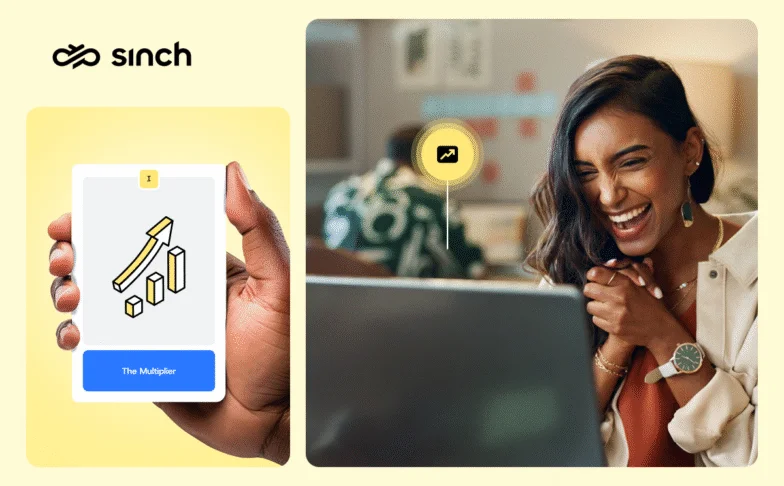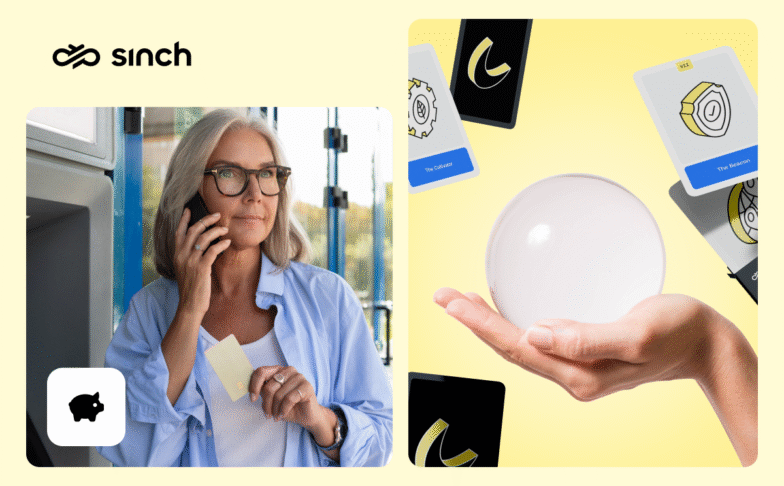Insights, Products
How to build an effective SMS campaign (with examples)

There’s one channel that stands out with nearly 100% open rates and most messages are read within just a few minutes: SMS. This degree of customer engagement and visibility is what makes SMS campaigns so effective as a means of connecting with customers and leads.
The challenge? Creating consistently productive SMS marketing campaigns that turn attention into action. High open rates are great, but your campaigns should also drive measurable results – like clicks, signups, purchases, and loyalty.
Today, we’re going to break down the building blocks of high-performing SMS campaigns and show how the right approach can move the needle on your key KPIs.
What is an SMS campaign?
An SMS campaign is a targeted marketing strategy that uses text messages to promote products, services, or events to a particular audience.
SMS marketing gets very high engagement. Nearly all of your subscribers will see and open your marketing texts shortly after delivery. And because text messages are short, they’re almost always read in full. This means you can get your whole message across nearly every time.
The tradeoff? SMS is bound by a 160-character limit. You can’t use SMS to send expansive messages, share detailed stories, or dive deep into features and benefits. SMS campaigns must be brief, to the point, and direct.
You also can’t send visuals like images, videos, emojis, or graphics with basic SMS. Your written text has to deliver the entire message, including motivating your subscribers to take action.
Messaging formats like MMS and RCS open the doors to images, videos, carousels, and richer interactions. But if you’re sticking to using texting for communicating with customers, success means being sharp, clear, and straight to the point.
Why SMS works so well for marketing campaigns
So much of effective marketing comes down to timing. A great message delivered too late (or too early!) risks getting ignored.
With SMS campaigns, you can deliver your message to your customers, leads, and subscribers exactly when you want to, and 82% of recipients will open it within five minutes. Why? One reason this happens is because text messages are mobile-native. Most people carry their mobile phones everywhere and read notifications as soon as they arrive.
SMS is also a powerful marketing tool when used in an omnichannel marketing strategy.
Let’s say you’re running a digital marketing campaign using display ads and social media. Many consumers in your target audience will probably see at least one of these ads, but most of them won’t act on it. Now, send them a text message with the same offer, and you’ve reinforced your message in a more personalized, direct manner.
SMS marketing strengthens customer retention. It offers you another media channel to reach them and a more personalized and immediate method for serving them.
Key elements of a successful SMS campaign
SMS marketing can outperform other channels, but only if you use it with intention. To get the most out of your campaigns, you need a clear strategy built around best practices.
The first step to achieve SMS success is to include the five essential components of effective text message marketing.
The five key elements of successful SMS marketing campaigns are:
A campaign goal and KPIs
Target audience segmentation
Message format and character limits
A clear CTA
Opt-in and opt-out compliance
A campaign goal and KPIs
An SMS campaign should focus on one clear goal. With only 160 characters to work with, clarity is key.
Once you set a goal, make sure you measure its success by identifying the relevant key performance indicators (KPIs). Just make sure you’re measuring the right things and tie each goal to specific KPIs so you can track performance and optimize.
Here are some examples of effective SMS campaign goals with measurable KPIs.
| SMS campaign goal | Possible KPIs |
| Drive sales via a dedicated landing page | Clicks and conversions |
| Recover abandoned carts | Revenue recovery |
| New event registrations | Signups and attendance |
| Create anticipation for a product launch | Pre-launch engagement |
| Encourage repeat purchases with promo codes | Track use of promo codes and tie it to retention |
Depending on your goal, useful KPIs could also be click-through rates, conversion rates, revenue generated, page visits, videos watched, registrations, opt-out rates, and more.
Target audience segmentation
Mass texts tend to be less effective than targeted texts. Audience segmentation will improve your customer engagement and conversion rates, and this relevance will lead to stronger customer loyalty.
You can segment your SMS subscriber list just like you would any other audience such as email subscribers, social media followers, or direct mailing recipients. You can segment by things like:
- Prior engagement levels
- Demographics
- Purchase history
- Lifecycle stage
- Repeat purchase rate
- Loyalty program membership
- Or other behaviors and characteristics
Smaller, more specific audience segments will let you speak directly to what your audience cares about.
Message format and character limits
Each SMS marketing message is limited to 160 characters by design (including your CTA and opt-out text). That means you shouldn’t sacrifice clarity for cleverness. Aim for punchy, direct message that get to the point fast.
It’s worth noting that if you want more room to write or access to other tools like visuals, MMS is a good option instead of SMS. Or, RCS can upgrade your SMS messaging as well.
A clear CTA
This may be the most important aspect of all. Be crystal clear with your CTA language. The subscriber should know what will happen if they click your CTA link. Vague CTAs like “learn more” and “click here” aren’t enough.
Instead, get specific while keeping it short. Here are a few short and sweet CTAs that work great for text messaging campaigns:
- Claim discount
- Buy today
- Use coupon
- See video
- Take poll
- Rate experience
Every word counts – especially your CTA!
Opt-in and opt-out compliance
SMS messages are sent via mobile carrier networks, not the internet. That can mean stricter compliance rules than other channels like email marketing in certain markets.
Here are a few customer-friendly guidelines:
- Keep your content free of inappropriate material
- Make it clear what subscribers are agreeing to when they opt in to your SMS contact list
- Don’t send SMS marketing at odd hours
- Never hide or delay unsubscribe options
- Consult with your own legal team or counsel before starting any new marketing program
“When you’re collecting opt-in, be upfront about what people are going to be receiving. If you get creative with the messages that you’re sending out, then you won’t be perceived as spammy. Think about sending out something that you would want to receive.”

It may seem obvious, but you need explicit consent before adding a subscriber’s phone number to your SMS campaign. Be consistent in offering them the chance to opt out, with clear instructions for how to do it and the necessary link. TCPA regulations explain all this in detail for U.S. companies, and there are global regulations as well. Check with legal experts to be sure you’re in compliance.
Always follow SMS marketing regulations, not just in your own country, but in every country where your subscribers live. The TCPA in the U.S. is just one example. When in doubt, check with legal experts.
How to plan and launch an SMS campaign
Writing a simple promotional SMS is easy. Building a campaign that drives results? That takes a bit more.
People are less tolerant of receiving marketing texts compared to marketing emails. It’s more personal and more immediate, which means your audience expects relevance and respect in every marketing text you send.
Follow the steps below to create SMS campaigns that deliver the results you want.
1. Set your campaign objective
Everything starts here. Clarify the specific objective for your campaign, and make sure your measurable KPIs align to that goal. This is where everything begins with SMS marketing.
2. Build your SMS list
Great SMS campaigns need great audiences. Start by building your SMS list using best practices. If you don’t have a quality subscriber list, it’s hard to know who should receive your text message marketing.
You can build your list using a combination of embedded forms, pop-up forms, and post-purchase special offers. When you ask people to opt-in, you can try using short codes, text-to-join keywords, incentives, and do so across multiple channels.
3. Craft your message
You only get 160 characters, so every word in your text message needs to pull its weight.
Stick to one core message, use plain language, and make your CTA clear. Your call to action should feel like a natural next step. Avoid clever introductions or slow-build narratives. Get straight to the point and drive it home.
4. Choose the right timing
Timing makes or breaks an SMS campaign. People don’t like to be buzzed awake by a marketing promotion – and text alerts are hard to ignore.
Take note of different time zones and respect quiet hours. Be sure to check with local regulations, business policies, and your legal team to make sure you’re meeting all requirements.
Think about timing from a strategic lens:
- Is it a time-sensitive offer?
- When are your customers most active?
- Is there a sense of urgency you can tap into?
5. Set up automation
Some SMS marketing campaigns can be automated, which will help scale your impact without sacrificing personalization. Use automation to trigger follow-ups or run automated follow-up sequences, like:
- Welcome messages for new subscribers
- Abandoned cart reminders
- Follow-up confirmations
- Transactional updates like appointments or shipping
Just make sure everything is tested and ready to go before launch!
6. Track performance
Lastly, be prepared to track the KPIs for your SMS campaign. Know what you plan to measure, how you plan to measure it, and how you might pivot based on what the metrics show. Be ready to adapt and adjust as the performance data comes in.
Some examples:
- High click-through rate but low conversions? Check your landing page.
- Low engagement? Review your message clarity or timing.
- High opt-out rate? Your audience might not find it relevant.
Campaigns are meant to evolve, so let the data guide your next move.
Pro tip: While this guide focuses on promotional SMS campaigns, much of it also applies to transactional messages like appointment reminders, order confirmations, and shipping notices. Transactional texts focus more on customer service than sales and marketing, but the core principles of timing, clarity, and relevance still apply.
SMS campaign templates and examples
Let’s bring it all together with a few text campaign examples in different industries.
Each message below ties to a specific goal, whether it’s driving purchases, re-engaging customers, or following up post-purchase. Notice how many could easily become personalized messages based on behavior or audience segment.
Alfredo Salkeld, Brand Director at Sinch SimpleTexting, encouraged brands to do just this during his Email Camp 2024 session, SMS strategies to punch above your weight.
“In order to compete with texting, you don’t need to offer a bigger discount. Oftentimes, you don’t need to offer a discount at all. The answer is also not to start texting more often. To win with text messaging, you have to get creative.”

Let’s dive into those examples, shall we?
Example 1: E-commerce flash sale
These examples are great for driving urgency and quick conversions when you’re running a time-sensitive promotion or campaign.
Flash footwear sale. Min 20% off all brands while supplies last or till 6pm Fri.
Find your next pair today! [LINK]
Text STOP to opt out
(139 characters)
Free $10 gift card. Spend at least $20 before 10pm EST today and win your free card. No expiration. Claim your $10 now. [LINK]
Reply STOP to be removed
(154 characters)
Brand new designs just dropped.
Be the first to show off your style. Limited supplies, don’t wait.
Shop new designs now: [LINK]
Text STOP to end
(151 characters)
Example 2: Post-purchase engagement
You could use these after a customer completes a purchase to request feedback or offer added value. Try them for boosting retention and building long-term trust!
Love your new clothes? Keep colors fresh.
Wash with special soap to extend color life 2+ years.
Get color protection [LINK]
Reply STOP to opt out
(147 characters)
Like your new tools? Tell us why!
Leave a quick review right here. We greatly appreciate your feedback.
Leave a review: [LINK]
Text STOP to be removed
(157 characters)
Example 3: Cart abandonment
Here are two templates to help give subscribers a gentle nudge – with or without an incentive – to remind them to come back and complete their purchase.
Did you forget something? It’s still in your shopping cart: [LINK]
Complete your purchase now and get 50% off your next purchase.
Text STOP to opt out
(154 characters)
Helpful reminder to make your life easier:
You left this in your shopping cart! [LINK]
Come get it before the deal expires.
Reply STOP to be removed
(154 characters)
Want more inspiration? Here are over 30 proven SMS templates to give your team some direction in creating transactional and promotional text messages.
Mistakes to avoid during your first SMS campaign
SMS campaigns are relatively simple, but that simplicity raises the stakes. With no room for visuals or long explanations, every word has to work. One typo in a ten-word message? Everyone will see it.
Here are a few common pitfalls to avoid in your SMS marketing strategy.
First, make sure you don’t send too many messages. Again, most companies can get away with sending several emails per week, especially if they’re segmenting their audiences. But with SMS, any more than one or two per week can frustrate subscribers and drive opt-outs. Pay attention to subscriber preferences and test what your audience responds to.
Next, make sure your call to action is crystal clear. You’ve seen several great examples of this already. It should be specific to the content of each campaign. Avoid vague, generic, uninspiring CTA language.
Also, don’t blast the same text message to your entire subscriber list unless it truly applies to everyone. With effective targeting, your SMS marketing will be more relevant and personal to each recipient. For instance, if you send texts about a particular product category, make sure they go to subscribers you already know are interested in those products.
Don’t forget to track your performance. Set up your SMS marketing platform so you know who and how many people are clicking and converting in response to your campaign. If you need to connect your SMS platform to your CRM to track revenue generated, make sure all the integrations are in working order before launching the campaign.
Lastly, make sure to avoid doing too much. Stick to one idea per message. If you have more to say, create a follow-up sequence. But each text should focus on just one thing.
Integrate your SMS campaign into your omnichannel strategy
The best SMS campaigns will amplify the rest of your marketing communications mix. SMS dovetails quite well with certain other marketing channels – particularly email marketing, social media, push notifications, and other elements of digital marketing.
For example:
- Pair a new product launch email with an SMS reminder before the promo ends
- Follow up a social campaign with a targeted text offer
- Use SMS to deliver in-store exclusives or loyalty rewards.
It can also work well for brick and mortar businesses by offering in-store-only deals. In online stores, it’s great for flash sales or post-purchase messaging.
You can start running SMS marketing campaigns at scale easily through our all-in-one messaging platform, Sinch Engage, or integrate our SMS API into your existing marketing platform or application. That’s how you’ll ensure timely, high-volume delivery across carriers, without manual effort.



